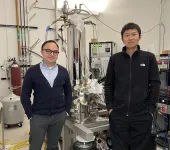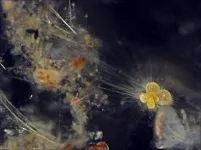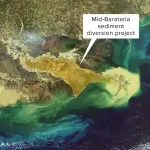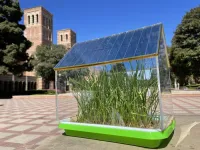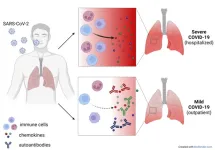(Press-News.org) Plastic is everywhere. Our society cannot do without it: plastics have numerous advantages, are extremely versatile, and are also cost effective. Today, plastics are mainly produced from crude oil. When the products reach the end of their life, they often end up in a waste incineration plant. The energy-intensive production of plastics and their incineration release large amounts of CO2 into the atmosphere, making plastic products a major contributor to climate change.
One way out would be to rely on sustainable production methods, such as the circular economy, in which as much plastic as possible is recycled. Then the main raw material for plastic products would no longer be crude oil but shredded plastic waste. But is it even possible to tweak the plastics economy to absolute sustainability? Yes, it is, shows a new study led by André Bardow, Professor of Energy and Process Systems Engineering at ETH Zurich. Gonzalo Guillén Gosálbez, Professor of Chemical Systems Engineering at ETH Zurich, and researchers from RWTH Aachen University and the University of California, Santa Barbara collaborated on the study.
Massively increased recycling rate needed
The scientists looked at the complete value chains of the 14 most common types of plastics, including polyethylene, polypropylene and polyvinyl chloride. These 14 bulk plastics account for 90 percent of the plastic products manufactured worldwide. In their study, the researchers investigated for the first time whether it is possible for the plastics industry to respect planetary boundaries. These are a measure of comprehensive sustainability. They go beyond energy and climate issues to include, for example, impacts on land and water resources, ecosystems and biodiversity. In short: processes that adhere to planetary boundaries can be sustained over the long term without depleting the Earth’s resources.
The study finds that circular plastics are feasible within planetary boundaries. This would require at least 74 percent of the plastic to be recycled. By way of comparison, only around 15 percent is recycled in Europe today, and the rate is likely to be much lower in other regions of the world. In addition, the study finds that recycling processes would have to be improved. Specifically, plastics recycling would have to become as efficient as other chemical processes already are today. As things currently stand, not all plastics can be recycled. In the case of polyurethanes used as foams, for example, recycling has yet to be established – a question Professor Bardow is also addressing.
For the remaining maximum 26 percent of plastics, the carbon needed for production could be sourced using two other technologies, according to the study: on the one hand, CO2 captured from combustion processes or from the atmosphere (known as carbon capture and utilisation or CCU), and on the other hand, from biomass. “Recycling alone won’t do it; we need all three pillars,” Bardow says.
“Increasing the recycling rate to 74 percent worldwide is a very ambitious goal,” Bardow admits. As such, it is unlikely to be achieved by 2030, but 2050 is more realistic. Another challenge, however, is that more plastic products are currently being manufactured year after year. If the current trend continues until 2050, it won’t be enough to simply improve recycling processes, as planetary boundaries would still be exceeded in 2050.
That is why the study’s authors suggest also addressing demand as well as assigning a different value to plastic. “Plastic is considered cheap, which for a long time was a blessing but has now become a curse,” Bardow says. “Given its outstanding properties, we should view plastic as the high-quality material it truly is. That way, it would be okay for it to cost a little more, and its recycling, too.”
A fuller understanding of product stewardship
In the study, the scientists point out that plastic products must be better aligned with the circular economy in future. To this end, manufacturers should work more closely with recyclers. According to the study’s authors, it would be desirable if plastics manufacturers had a wider understanding of the responsibility they hold: Today, responsibility often ends where the product leaves the factory gates. The scientists therefore call for product stewardship to encompass the entire life cycle – including disposal and recycling – as the basis for optimising the design of sustainable processes.
In any case, pushing recycling is the right way to go: given that it has no serious disadvantages, it should be treated as a special case in the transformation of the economy toward sustainability. In many other areas, conflicting goals arise. Take, for example, the production of synthetic fuels, which is extremely energy-intensive, or the use of biomass, which competes with food production. Recycling plastic, on the other hand, does not lead to such a conflict of goals. “Recycling efforts should be intensified wherever possible,” Bardow says. “As a good rule of thumb: More recycling of plastic always leads to more sustainability.”
ETH Zurich's part in this study was conducted under the auspices of the National Centre of Competence in Research (NCCR) Catalysis [https://www.nccr-catalysis.ch/].
END
A wholly sustainable plastics economy is feasible
2023-03-06
ELSE PRESS RELEASES FROM THIS DATE:
Graphene quantum dots show promise as novel magnetic field sensors
2023-03-06
Trapped electrons traveling in circular loops at extreme speeds inside graphene quantum dots are highly sensitive to external magnetic fields and could be used as novel magnetic field sensors with unique capabilities, according to a new study.
Electrons in graphene (an atomically thin form of carbon) behave as if they were massless, like photons, which are massless particles of light. Although graphene electrons do not move at the speed of light, they exhibit the same energy-momentum relationship as photons and can be described as “ultra-relativistic.” ...
Parental nonadherence to recommendations for COVID-19 prevention among children
2023-03-06
About The Study: In this survey study of U.S. parents, one-quarter engaged in misrepresentation or nonadherence regarding public health measures for their children. The most common reason was to preserve parental autonomy. Additional reasons included wanting to resume a normal life for their child and the inability to miss work or other responsibilities, among other reasons.
Authors: Andrea Gurmankin Levy, Ph.D., M.B.E., of Middlesex Community College in Middletown, Connecticut, is the corresponding author.
To access the embargoed study: Visit our ...
Mineral particles and their role in oxygenating the Earth’s atmosphere
2023-03-06
Mineral particles played a key role in raising oxygen levels in the Earth’s atmosphere billions of years ago, with major implications for the way intelligent life later evolved, according to new research.
Up to now, scientists have argued that oxygen levels rose as the result of photosynthesis by algae and plants in the sea, where oxygen was produced as a by-product and released into the atmosphere.
But a research ...
Two-dimensional quantum freeze
2023-03-06
Glass nanoparticles trapped by lasers in extreme vacuum are considered a promising platform for exploring the limits of the quantum world. Since the advent of quantum theory, the question at which sizes an object starts being described by the laws of quantum physics rather than the rules of classical physics has remained unanswered.
A team formed by Lukas Novotny (Zurich), Markus Aspelmeyer (Vienna), Oriol Romero-Isart (Innsbruck), and Romain Quidant (Zurich) is attempting to answer precisely this question within the ERC-Synergy project Q-Xtreme. A crucial step ...
Scientists twist chemical bonds beyond their limits
2023-03-06
A group of scientists from Durham University and University of York have twisted molecules to their breaking point in order to challenge the understanding of chemical bonds.
The researchers explored how far the chemical bonding in an aromatic ring can be twisted before its aromatic bonding breaks.
They achieved this by making overcrowded aromatic rings. Rather than benzene, they used tropylium, which shares electrons around a ring of seven carbon atoms.
Each of these carbon atoms can be functionalised and having seven attachment points in the ring, rather than the six carbon atoms of benzene, allowed ...
Siblings should be screened in cases of suspected child physical abuse
2023-03-06
Siblings of a child suspected of experiencing physical abuse should also be screened for abusive injuries, according to a new international consensus statement led by researchers at UCL (University College London) and Great Ormond Street Hospital for Children (GOSH).
The team of 27 researchers, from six different continents, are calling for a policy change to stop inconspicuous injuries being missed in contact children (i.e. siblings, cohabiting children, or children who are under the same care), and to help prevent further ...
Rewarding accuracy instead of partisan pandering reduces Republican-Democrat divide over the truth – study
2023-03-06
Offering a tiny cash reward for accuracy, or even briefly appealing to personal integrity, can increase people’s ability to tell the difference between misinformation and the truth, according to a new study.
The findings suggest that fake news thrives on social media not only because people are tricked into believing it, but also due to a motivational imbalance: users have more incentive to get clicks and likes than to spread accurate content.
Social psychologists from the University of Cambridge and New York University argue that their study, published in the journal ...
New study compares human contributions to Mississippi river delta land loss, hints at solutions
2023-03-06
Research from scientists at Louisiana State University and Indiana University reveals new information about the role humans have played in large-scale land loss in the Mississippi River Delta—crucial information in determining solutions to the crisis.
The study published today in Nature Sustainability compares the impacts of different human actions on land loss and explains historical trends. Until now, scientists have been unsure about which human-related factors are the most consequential, and why the most rapid land loss in the Mississippi River Delta occurred between the 1960s and 1990s and ...
UCLA engineers design solar roofs to harvest energy for greenhouses
2023-03-06
As countries around the globe seek sustainable energy sources and the U.S. endeavors to become a net-zero emissions economy by 2050, renewable energy sources such as solar panels are in high demand.
However, solar panels can take up significant space and are often difficult to scale. Enter the new field of agrivoltaics, which focuses on the simultaneous use of land for both solar power generation and agriculture. For example, replacing the glass in greenhouses with solar panels could power the lamps and water controls in the greenhouse, or even the whole farm. But how does one build solar panels that can absorb energy from sunlight without blocking the light ...
'Good autoantibodies' could help against long Covid
2023-03-06
Sometimes in the laboratory there are unexpected results. "Previously it had been observed that autoantibodies are common in severe Covid patients, those who end up in intensive care," says Jonathan Muri, postdoctoral fellow at the Institute for Research in Biomedicine (IRB, affiliated with the Università della Svizzera italiana) and co-author of the study. "Instead, in this case we discovered the opposite."
The autoantibodies in question neutralize chemokines, molecules that direct immune cell trafficking. "Chemokines are a bit like traffic lights: they tell our immune cells when and where to go in the case ...
